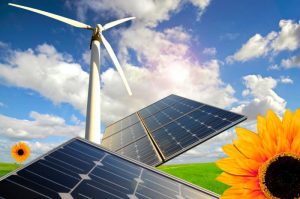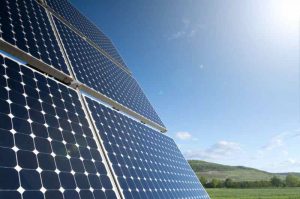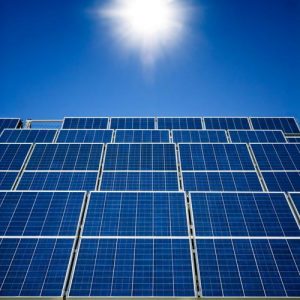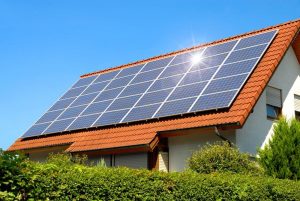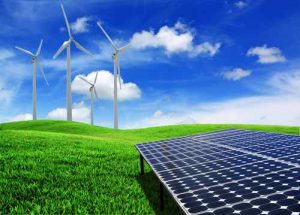Solar airconditioning: using sun’s energy when it most abundent and needed
Is solar energy sufficient to run air conditioners? If yes, how wonderful it would be to live in an air-conditioned place without bothering about the electricity bills! And the best thing: you use solar energy when it is most readily available and you need it the most. The question is however, can the AC run only on solar energy or does it need electricity as well. It depends on the technology and that has an impact on the cost of the AC. We at Bijli Bachao get this question from many readers that can they use a Solar PV system for running air conditioners. With this article we will try to explain what is possible and what is not.
How does an air conditioner work?
An Air Conditioner has 3 components: compressor, condenser and evaporator. The core to the cooling of an air conditioner is a refrigerant that moves in the air conditioning system. The refrigerant comes in as a cool low-pressure gas in the compressor, which uses electricity to compress it to a high-energy hot gas. The fluid then goes into the condenser where it dissipates all the heat and converts into very cold liquid under high pressure. It then goes into the evaporator where it cools the room air, which is thrown out.
In this whole process, the compressor consumes the highest amount of electricity to heat and compress the refrigerant.
Can Photo Voltaic system be used for Air Conditioning?
Although technically it is possible to use PV for air conditioning but it is never the preferred option. In a previous article (link) we discussed on the differences between Solar Thermal and Solar PV systems and how a Solar Thermal system is much more efficient and cost effective as compared to a Solar PV system. Thus Solar Thermal process for Air Conditioning is preferred as compared to a Solar PV process.
Also with a PV system one needs to install an inverter (or inverter-battery) system to make the whole thing work with the air conditioner. And there are very few inverter systems available in the market that can take load of an air conditioner. Thus PV offers very less possibility of running an air conditioning system. Another technology which is used internationally is using compressors that can operate on DC.
How can Solar Thermal Hybrid system benefit?
Compressor, which is the most electricity-consuming unit of air conditioner essentially, compresses low-pressure fluid which in turn gets heated. A solar collector panel (just like the one used in solar water heaters) can assist in heating the fluid and thus can reduce the load on the compressor, which in turn will reduce the electricity consumption. Solar collector panels are much cheaper as compared to PV units and are more efficient in converting solar energy to useful energy.
The only caveat with a Solar Thermal system is that it does require electricity and cannot run without it. These systems are called Hybrid systems because they use both electricity and solar energy. Their efficiency during the night when there is no sun is questionable. But being a hybrid system, it can surely work during the night on electricity.
Vapor Absorption type Solar Air Conditioners
The greenest and the least electricity consuming solar air conditioners are of “Vapor Absorption” type. These air conditioner do not use CFC as refrigerant, instead they work on water. Being CFC free they are harmless for environment. They also do not have a compressor, thus completely eliminating the most electricity-consuming unit. It has an assembly of evaporator, absorber, heat exchanger, condenser that uses water and absorbent like Li Br or NH3 to do the air conditioning. The electricity is used only for fans, chillers and hot water pumps (which is less compared to conventional air conditioner). As there is no compressor in these systems these are quite silent as well.
Although these systems can work for extended hours even after sunny hours, their use in night is limited. Some such systems can also be used with LPG as a backup source, but that can turn out costlier than electricity.
Benefits of using solar air conditioning
The air conditioners that we see all around us require electricity to cool the rooms. Solar air conditioners use energy from sun to provide some or all of the energy required to produce cooling. Hence, by using solar air conditioners you can either reduce or eliminate the need electricity required for cooling. In a typical house using air conditioners, the electricity required for cooling can be as high as 30-40% of the total electricity used. In commercial complexes, this percentage is even higher. The amount of saving that you can get from solar air conditioning depends on the amount you currently spend on conventional air conditioning.
Solar air conditioning can provide significant environmental benefits. Air conditioners are one of the major contributors to peak demand for electricity and solar air conditioners offer the benefit of peak load shifting in addition to the reduction in total energy requirement thereby reducing stress on the grid.
Are subsidies available on Solar Air Conditioners?
Yes they are. MNRE does give subsidies on solar air conditioners, just that their availability in Indian market is limited. As per the market research undertaken by Bijli Bachao there are only a handful manufacturers or retailers selling solar air conditioners in the Indian air conditioner market. Some of the households have reported use of solar assisted air conditioners imported from international market.
From the consumer’s point of view, the most important consideration is, whether the AC runs only on solar energy or does it require electricity and can it provide sufficient cooling at affordable cost. In cities where electricity supply is reliable, use of solar assisted cooling can reduce the electricity requirement and hence help in reducing the electricity bill due to air conditioning. In areas where electricity supply is intermittent and unreliable, use of air conditioners that run only on solar energy is the best option.
About the Author:
Abhishek Jain is an Alumnus of IIT Bombay with almost 10 years of experience in corporate before starting Bijli Bachao in 2012. His passion for solving problems moved him towards Energy Sector and he is keen to learn about customer behavior towards Energy and find ways to influence the same towards Sustainability. More from this author.

